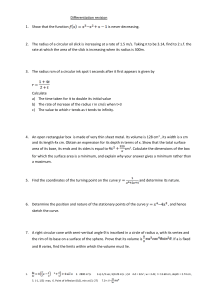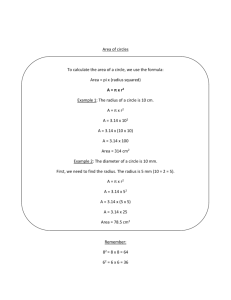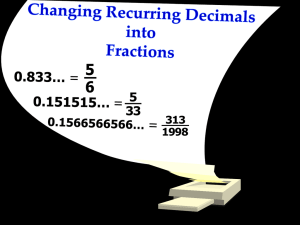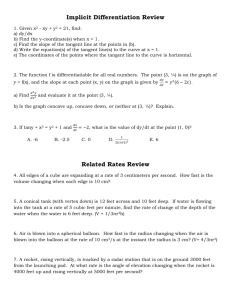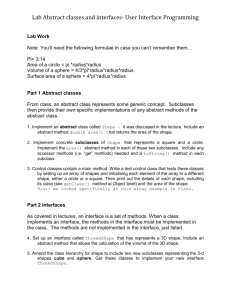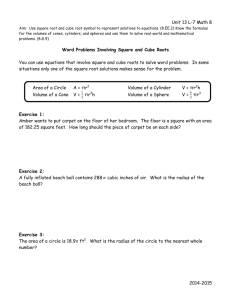related rates of change
advertisement
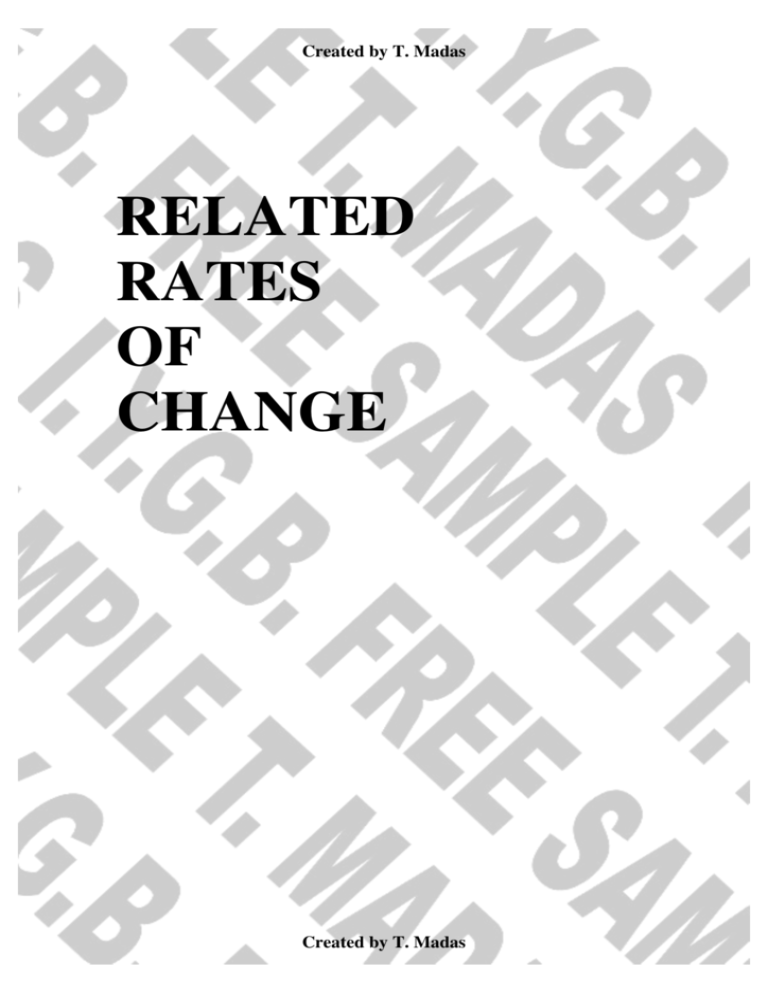
Created by T. Madas RELATED RATES OF CHANGE Created by T. Madas Created by T. Madas Question 1 (**) The radius, r cm , of a circle is increasing at the constant rate of 3 cm s −1 . Find the rate at which the area of the circle is increasing when its radius is 13.5 cm . C4R , 81π ≈ 254 cm 2 s −1 Question 2 (**) The side of a cube of length x cm , is increasing at the constant rate of 1.5 cm s −1 . Find the rate at which the volume of the cube is increasing when its side is 6 cm . C4Q , 162 cm3 s −1 Created by T. Madas Created by T. Madas Question 3 (**) The volume, V cm3 , of a sphere is given by V = 4 π r3 , 3 where r is its radius. The radius of a sphere is increasing at the constant rate of 2.5 cms −1 . Find the rate at which the volume of the sphere is increasing when its radius is 8 cm . C4E , 640π ≈ 2011 cm3 s −1 Created by T. Madas Created by T. Madas Question 4 (**) The surface area, S cm 2 , of a sphere is increasing at the constant rate of 512 cm 2 s −1 . The surface area of a sphere is given by S = 4π r 2 , where r cm is its radius. Find the rate at which the radius r of the sphere is increasing, when the sphere’s radius has reached 8 cm . C4A , Created by T. Madas 8 π ≈ 2.55 cms −1 Created by T. Madas Question 5 (**+) The volume, V cm3 , of a metallic cube of side length x cm , is increasing at the constant rate of 0.108 cm3s −1 . a) Determine the rate at which the side of the cube is increasing when the side length reaches 3 cm . b) Find the rate at which the surface area of the cube, A cm 2 , is increasing when the side length reaches 3 cm . C4A , 1 = 0.004 cms −1 , 18 = 0.144 cm 2 s −1 250 125 Question 6 (***) The area, A cm 2 , of a circle is increasing at the constant rate of 12 cm 2s −1 . Find the rate at which the radius, r cm , of the circle is increasing, when the circle’s area has reached 576π cm 2 . C4A , Created by T. Madas 1 ≈ 0.0796 cm s −1 4π Created by T. Madas Question 7 (***) x = 4sin θ + 7 cos θ . The value of θ is increasing at the constant rate of 0.5 , in suitable units. Find the rate at which x is changing, when θ = π 2 . C4I , − 7 2 Question 8 (***) Fine sand is dropping on a horizontal floor at the constant rate of 4 cm3s −1 and forms a pile whose volume, V cm3 , and height, h cm , are connected by the formula V = −8 + h 4 + 64 . Find the rate at which the height of the pile is increasing, when the height of the pile has reached 2 cm . C4M , Created by T. Madas 5 ≈ 2.24 cm s −1 Created by T. Madas Question 9 (***) An oil spillage on the surface of the sea remains circular at all times. The radius of the spillage, r km , is increasing at the constant rate of 0.5 km h −1 . a) Find the rate at which the area of the spillage, A km 2 , is increasing, when the circle’s radius has reached 10 km . A different oil spillage on the surface of the sea also remains circular at all times. The area of this spillage, A km 2 , is increasing at the rate of 0.5 km 2 h −1 . b) Show that when the area of the spillage has reached 10 km 2 , the rate at which the radius r of the spillage is increasing is 1 km h −1 . 4 10π 10π ≈ 31.4 km 2 h −1 Created by T. Madas Created by T. Madas Question 10 (***) Liquid dye is poured onto a large flat cloth and forms a circular stain, the area of which grows at a steady rate of 1.5 cm 2s −1 . Calculate, correct to three significant figures, … a) … the radius, in cm , of the stain 4 seconds after it started forming. b) … the rate, in cm s −1 , of increase of the radius of the stain after 4 seconds. C4C , r = 6 π ≈ 1.38 cm , 3 ≈ 0.173 cms −1 32π Question 11 (***) The variables y , x and t are related by the equations 27 y = 15 4 − 3 x + 3 ( ) Find the value of and 1 ln ( x + 3) = t , x > −3 . 3 dy , when x = 9 . dt C4K , Created by T. Madas dy 15 = dt 64 Created by T. Madas Question 12 (***+) Two variables x and y are related by y = 1 π x2 ( 4 − x ) . 4 The variable y is changing with time t , at the constant rate of 0.2 , in suitable units. Find the rate at which x is changing with respect to t , when x = 2 . 1 ≈ 0.0637 5π Question 13 (***+) The variables y , x and t are related by the equations 1 x −1 y = 10e 5 Find the value of and x = 6t + 1 , t ≥ 0 . dy , when t = 4 . dt C4N , Created by T. Madas dy 6 = dt t =4 5 Created by T. Madas Question 14 (****) Liquid is pouring into a container at the constant rate of 30 cm3s −1 . The container is initially empty and when the height of the liquid in the container is h cm the volume of the liquid, V cm3 , is given by V = 36h 2 . a) Find the rate at which the height of the liquid in the container is rising when the height of the liquid reaches 3 cm . b) Determine the rate at which the height of the liquid in the container is rising 12.5 minutes after the liquid started pouring in. C4O , 5 = 0.139 cms −1 , 1 = 0.0167 cm s −1 36 60 Created by T. Madas Created by T. Madas Question 15 (****) The radius R of a circle, in cm , at time t seconds is given by ( ) R = 10 1 − e− kt , where k is a positive constant and t > 0 . Show that if A is the area of the circle, in cm 2 , then dA = 200π k e− kt − e−2 kt . dt ( ) proof Created by T. Madas Created by T. Madas Question 16 (****) The volume of water, V cm3 , in a container is given by the formula V = 3x 2 + 2 x3 , where x is the depth of the water in cm . a) Find the value of dV when x = 11 . dx It is further given that the volume of the water in the container is increasing at the constant rate of 14.4 cm3s −1 b) Determine the rate at which the depth of the water in the container is increasing when the depth has reached 11 cm . C4F , 7.2 cm3 s −1 , 2 cm s −1 Created by T. Madas Created by T. Madas Question 17 (****) Oil leaking from a damaged tanker is forming a circular oil spillage on the surface of the sea, whose area is increasing at the constant rate of 360 m 2 s −1 . We may assume that the spillage is of negligible thickness. a) Find the rate at which the radius of the oil spillage is increasing when the radius of the spillage reaches 100 m . b) Determine the rate at which the radius of the oil spillage is increasing 1 minute after it started forming. 9 ≈ 0.573 ms −1 , 5π Created by T. Madas 3 ≈ 0.691 m s −1 2π Created by T. Madas Question 18 (****) A bubble is formed and its volume is increasing at the constant rate of 300 cm3s −1 . The shape of the bubble remains spherical at all times. Find the rate at which the radius of the bubble is increasing … a) … when the radius of the bubble reaches 15 cm . b) … ten seconds after the bubble was first formed. volume of a sphere of radius r is given by 4 π r 3 3 C4Z , 1 ≈ 0.106 cms −1 , 3π Created by T. Madas 3 1 ≈ 0.298 cm s −1 12π Created by T. Madas Question 19 (****) The shape of a bubble remains spherical at all times. A bubble is formed and its radius is increasing at the constant rate of 0.2 cm s −1 . a) Find the rate at which the volume of the bubble is increasing when the radius of the bubble reaches 8 cm . b) Determine the rate at which the volume of the bubble is increasing when the surface area of the bubble reaches 64cm 2 . c) Calculate the rate at which the surface area of the bubble is increasing 30 seconds after the bubble was first formed. surface area of a sphere of radius r is given by 4π r 2 volume of a sphere of radius r is given by 4 π r 3 3 256π ≈ 161 cm3 s −1 , 5 64 48π = 12.8 cm3 s −1 , = 30.16 cm 2 s −1 5 5 Created by T. Madas Created by T. Madas Question 20 (****) A cube has side length x cm , surface area A cm 2 and volume V cm3 . a) Show clearly that 3 A 2 V = . 6 The surface area of the cube is increasing at the constant rate of 0.25 cm 2 s −1 . b) Find, in terms of surds, the rate at which the volume of the cube is increasing when its surface area has reached 16 cm 2 . 1 6 24 Created by T. Madas Created by T. Madas Question 21 (****) Air is pumped into a balloon at the constant rate of 15 cm3 s −1 . The shape of the balloon remains spherical at all times. a) Find the rate at which the radius of the balloon is increasing when its radius has reached 10 cm . b) If the balloon is initially empty, find the rate at which its radius is increasing 5 minutes after the air started being pumped in. volume of a sphere of radius r is given by 4 π r 3 3 1 3 ≈ 0.0119 cm s −1 , ≈ 0.0114 cms −1 80π 60 3 π Created by T. Madas Created by T. Madas Question 22 (****) The radius r of a circle is changing so that dr 1 = . dt r 2 Show that the rate at which the area of the circle A changes satisfies the equation dA 4π 3 = . dt A proof Created by T. Madas Created by T. Madas Question 23 (****) gas x A piston can slide inside a combustion cylinder which is closed at one end. The cylinder is filled with gas whose pressure P , in suitable units, is given by P= 60 , x≠0 x where x is the distance, in cm , of the piston from the closed end. At a given instant • the distance of the piston from the closed end is 5 cm . • its speed is 15 cm s −1 , moving away from the closed end. Determine the rate at which the pressure of the gas is changing at that given instant. C4P , Created by T. Madas dP = −36 dt Created by T. Madas Question 24 (****) The volume of the water, V m3 , in a container satisfies 2 V = x3 e− x , where x m is the depth of the water in the container. Find the rate of increase of the volume of the water in the container when its depth is 0.5 m and is rising at the rate of 0.01 ms −1 . 1 − 14 e ≈ 0.00487 m3s −1 160 Created by T. Madas Created by T. Madas Question 25 (****) 18 cm 72 cm h Flowers at a florists’ are stored in vases which are in the shape of hollow inverted right circular cones with height 72 cm and radius 18 cm . One such vase is initially empty and placed under a tap where the water is flowing into the vase at the constant rate of 6π cm3 s −1 . a) Show that the volume, V cm3 , of the water in the vase is given by V = 1 π h3 , 48 where, h cm , is the height of the water in the vase. b) Find the rate at which h is rising when h = 4 cm . c) Determine the rate at which h is rising 12.5 minutes after the vase was placed under the tap. volume of a cone of radius r and height h is given by 1 π r 2h 3 C4G , 6 cms −1 , 2 ≈ 0.0267 cm3 s −1 75 Created by T. Madas Created by T. Madas Question 26 (****) The surface area A , of a metallic cube of side length x , is increasing at the constant rate of 0.45 cm3 s −1 . Find the rate at which the volume of the cube is increasing, when the cube’s side length is 6 cm . 27 = 0.675 cm3 s −1 40 Question 27 (****) After a road accident, fuel is leaking from a tanker onto a flat section of the motorway forming a circle of thickness 3 mm . Petrol is leaking at a steady rate of 0.0008 m3s −1 Find, in terms of π , the rate at which the radius of the circle of petrol is increasing at the instant when the radius has reached 6 m . 1 45π Created by T. Madas Created by T. Madas Question 28 (****) 1m h A tank for storing water is in the shape of a hollow inverted hemisphere with a radius of one metre. It can be shown by calculus that when the depth of the water in the tank is h m , its volume, V m3 , is given by the formula 1 V = π h2 (3 − h ) . 3 a) Find the volume of the water in the tank when h = 0.5 . The tank is initially empty and water then begins to pour in at the constant rate of π 24 m3 per hour. b) Determine the rate at which the height of the water is increasing 5 hours later. C4Y , V = 5π 3 m , 1 = 0.0556 m h −1 18 24 Created by T. Madas Created by T. Madas Question 29 (****+) 45cm h 60° A container, in the shape of a hollow inverted cone, is filled up the water. The height of the container is 45 cm and the angle between the sides of the cone, when viewed as a cross section, is 60° . a) Show that the volume, V cm3 , of the water in the container is given by 1 V = π h3 , 9 where h cm is the height of the water in the container. The container is filled up with water to the rim and then the water is allowed to leak from a small hole at the bottom of the cone, at the constant rate of 80 cm3s −1 . b) Determine the rate at which the height of the water is decreasing … i. … when the height of the water is 20 cm . ii. … five minutes after the leaking started. C4U , − 3 ≈ −0.191 cms −1 , ≈ −0.0962 cm s −1 5π Created by T. Madas Created by T. Madas Question 30 (****+) x 4x A metal bolt is in the shape of a right circular cylinder, with radius x cm and length 4 x cm . The bolt is heated so that the area of its circular cross section is expanding at the constant rate of 0.036 cm 2 s −1 . Find the rate at which the volume of the bolt is increasing, when the radius of the bolt has reached 1.25 cm . (You may assume that the bolt is expanding uniformly when heated.) C4V , 0.27 cm3 s −1 Created by T. Madas Created by T. Madas Question 31 (****+) The surface area S of a sphere is increasing at the constant rate of 16 cm 2 s −1 . Find the rate at which the volume V of the sphere is increasing, when the sphere’s surface area is 625π cm 2 . surface area of a sphere of radius r is given by 4π r 2 volume of a sphere of radius r is given by 4 π r 3 3 C4W , 100 cm3s −1 Question 32 (****+) The surface area of a sphere is decreasing at the rate of 6 cm 2 s −1 at the instant when its radius is 12 cm . Find the rate at which the volume of the sphere is decreasing at that instant. surface area of a sphere of radius r is given by 4π r 2 volume of a sphere of radius r is given by 4 π r 3 3 C4X , 36 cm3 s −1 Created by T. Madas Created by T. Madas Question 33 (*****) y P ( 0,5 ) B ( 0, y ) x O A ( x,0 ) Two particles, A and B , can move on the positive x axis and positive y axis respectively. They are connected with a rope which remains taut at all times. Particle A has coordinates ( x,0 ) metres, where x ≥ 0 and particle B has coordinates ( 0, y ) metres, where 0 ≤ y ≤ 5 . The rope connecting the two particles has a length of 15 metres and passes over a small fixed pulley located at P ( 0,5 ) metres. a) Show that dy x = . dx y + 10 [ continues overleaf ] Created by T. Madas Created by T. Madas [ continued from overleaf ] At a given instant the particle A is at the point with coordinates (12,0 ) metres and moving away from O with a speed of 6.5 metres per second. b) Find the rate at which the particle B is rising at that instant. SP-X , 6 ms −1 Created by T. Madas Created by T. Madas Question 34 (*****) D h An air bubble, rising in a water tank, increases in volume as the pressure of the fluid around it decreases. It is assumed that the shape of the bubble remains spherical at all times. It is further assumed the volume V cm3 of an air bubble satisfies the equation V= k , D−h where h cm is the height of the bubble from the bottom of the tank, D cm is the depth of the water in the tank, and k is a positive constant. The tank is filled up with water to a depth of 800 cm . A bubble with a volume of 8 cm3 is created in the water tank at a height of 350 cm from the bottom of the tank. [ continues overleaf ] Created by T. Madas Created by T. Madas [ continued from overleaf ] Show that by the time the bubble has risen by 50 cm , … a) … the volume of the bubble increases to 9 cm3 b) … the volume of the bubble increases at the rate of 9 cm3 per cm risen. 400 c) … the rate at which the radius of the bubble is increasing is 1 cm per cm risen. 400 3 4π C4S , proof Created by T. Madas Created by T. Madas Question 35 (*****) A metallic component is in the shape of a right circular cone, with radius 4 x cm and height 3 x cm . The metallic component is heated so that the area of its curved face is expanding at a rate inversely proportional to x . a) Show that volume of the metallic component is increasing at a constant rate. b) Find the percentage rate of increase of the base area relative to the curved face area metallic component. (You may assume that the metallic component is expanding uniformly when heated.) [surface area of the curved face of a cone of radius r and slant height l , is given by π rl ] volume of a cone of radius r and height h, 1 π r 2 h 3 SP-S , 80% Created by T. Madas Created by T. Madas Question 36 (*****) θ y Fine sand starts falling onto a horizontal floor at the constant rate of 3.2 cm3s −1 . A heap is formed in the shape of a right circular cone of height y cm , where t is the time in seconds since the sand started falling. The angle θ between the vertical height and the slant height of the cone is such so that tan θ = 1 , as shown in the figure. 3 a) Show clearly that y3 = 144t . 5π [ continues overleaf ] Created by T. Madas Created by T. Madas [ continued from overleaf ] The curved surface area of the heap is A cm 2 . b) Show further that when t = 60 , … i. … dy 1 − 13 = π . dt 15 ii. … dA 16 13 = π . dt 15 You may assume that the volume V and curved surface area A of a cone of radius r and height h are given by 1 V = π r 2h 3 and A = π r r 2 + h2 . C4T , proof Created by T. Madas Created by T. Madas Question 37 (*****) An extended ladder AB , of length 20 m , has one end A on level horizontal ground and the other end B resting against a vertical wall. The end A begins to slip away from the wall with constant speed 0.3 ms −1 , and the end B slips down the wall. Determine the speed of the end B , when B has reached a height of 12 m above the ground. 0.4 ms −1 Created by T. Madas Created by T. Madas Question 38 (*****) 6 1.5 shadow The light bulb in a lamp-post stands 6 m high. A boy, of height 1.5 m , is walking in a straight line away from the lamp-post at constant speed of 1.5 ms −1 . Determine the rate at which the length of its shadow is increasing. SP-P , 0.5 ms −1 Created by T. Madas
